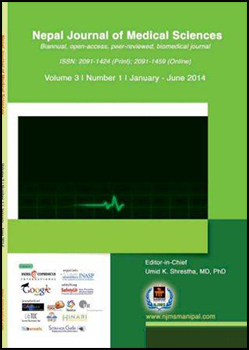Factors affecting Early Age Marriage in Dhankuta Municipality, Nepal
DOI:
https://doi.org/10.3126/njms.v3i1.10354Keywords:
Early age marriage, factors, socio-economic statusAbstract
Background: Child marriage is a substantial barrier to social and economic development in Nepal, and a primary concern for women’s health. Little evidence from Nepal is available regarding the ways in which early marriage may compromise young women’s lives and their reproductive health and choices. The objectives of this study was to find out the factors associated with early age marriages in Dhankuta Municipality.
Methods: The cross-sectional study was conducted among the residents of Dhankuta municipality, Nepal; where 246 households were taken as subjects. Pretested semi-structured questionnaire was administered to the study subjects and face to face interview was conducted. Chi-square test was applied to find out the association between factors and age of marriages.
Results: Almost 53.3% of women were married before age 18 years. Education of wife and husband, and economic status are found to be the important variables in explaining early age marriage. Prevalence of child marriage was higher in Hindu than in Buddhist and Christian women but the difference was not significant. Age of marriage was not significantly associated with contraceptive use. Unwanted pregnancies were higher in early age marriage. It was also seen that unwanted pregnancies was higher (59.3%) than wanted pregnancies (48.6%).
Conclusion: The findings of the study indicate that early age marriage was associated with low education and being poor.
Nepal Journal of Medical Sciences | Volume 03 | Number 01 | January-June 2014 | Page 26-30
Downloads
Downloads
Published
How to Cite
Issue
Section
License
Copyright © by Nepal Journal of Medical Sciences. The ideas and opinions expressed by authors of articles summarized, quoted, or published in full text in this Journal represents only opinions of authors and do not necessarily reflect the official policy of Nepal Journal of Medical Sciences or the institute with which the author(s) is (are) affiliated, unless so specified.




